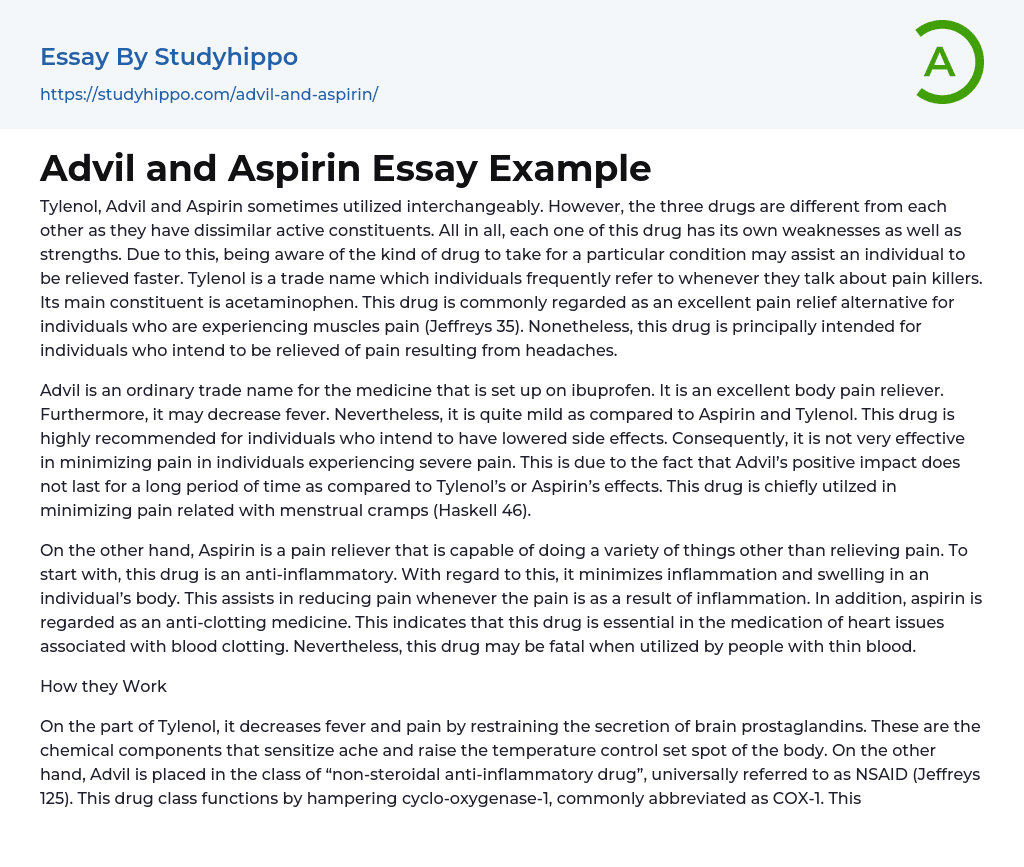Although Tylenol, Advil, and Aspirin can be used interchangeably, they have distinct active ingredients that set them apart. Each drug has its own advantages and disadvantages, so knowing which one is appropriate for a particular condition can lead to faster relief. Tylenol, a well-known painkiller brand commonly referred to by people, contains acetaminophen as its main ingredient. It is widely recognized as an effective choice for relieving muscle pain (Jeffreys 35), but it is primarily intended for individuals who need relief from headaches.
Advil, which contains ibuprofen, is a popular brand of medication that effectively relieves pain and fever. It is recommended for those wanting to minimize side effects as it is less potent than Aspirin and Tylenol. However, its positive effects do not last as long as Tylenol or Aspirin, making it less effective for severe pain relief. Advil is commonly used for relieving menstrua
...l cramp-related pain (Haskell 46). On the other hand, Aspirin not only alleviates pain but also has anti-inflammatory properties that reduce inflammation and swelling in the body. This can be especially beneficial when pain is caused by inflammation. Additionally, Aspirin has anti-clotting effects that are important in treating heart issues related to blood clotting. However, individuals with thin blood should be cautious when taking this medication. Tylenol works by inhibiting the production of brain prostaglandins - chemical compounds that sensitize pain and increase body temperature. This mechanism allows Tylenol to effectively reduce both fever and pain. Both Advil and Aspirin belong to the class of medications known as non-steroidal anti-inflammatory drugs (NSAIDs), which inhibit the activity of certain enzymes called cyclo-oxygenase-1 (COX-1) and cyclo-oxygenase-2 (COX-2).COX-1 produces prostaglandins, which cause pain and
inflammation, while COX-2 is responsible for inflammation. Both Advil and Aspirin effectively relieve pain, reduce fever, and alleviate muscle and joint discomfort. However, it's important to note that Aspirin has a unique effect on platelets involved in blood clotting, which is permanent and irreversible. Each medication has its own potential side effects that vary from person to person. For instance, those with alcohol dependency should avoid Tylenol, whereas individuals with thin blood should avoid Aspirin. Therefore, when choosing a pain reliever, it is crucial to consider these similarities and differences. Consulting a doctor is essential for determining the appropriate medication based on individual needs as following their guidance can help prevent severe side effects associated with these medications.
- Cocaine essays
- Why Marijuana Should Be Legalized essays
- Drug Abuse essays
- Teenage Drug Abuse essays
- alternative medicine essays
- Aspirin essays
- Cannabis essays
- Cardiology essays
- Cloning essays
- Dentist essays
- drugs essays
- Hemoglobin essays
- Medical essays
- Medical Ethics essays
- Organ Donation essays
- Patient essays
- Pharmacology essays
- Plastic Surgery essays
- Surgery essays
- Therapy essays
- Vaccines essays
- Apoptosis essays
- Asthma essays
- Black Death essays
- Breast Cancer essays
- Cholesterol essays
- Chronic essays
- Chronic Pain essays
- Death essays
- Diabetes essays
- Down Syndrome essays
- Epidemic essays
- Hypertension essays
- Infection essays
- Infertility essays
- Myocardial Infarction essays
- Pain essays
- Pathogen essays
- Pregnancy essays
- Sexually Transmitted Disease essays
- Symptom essays
- Tuskegee Syphilis Experiment essays
- Water supply essays




